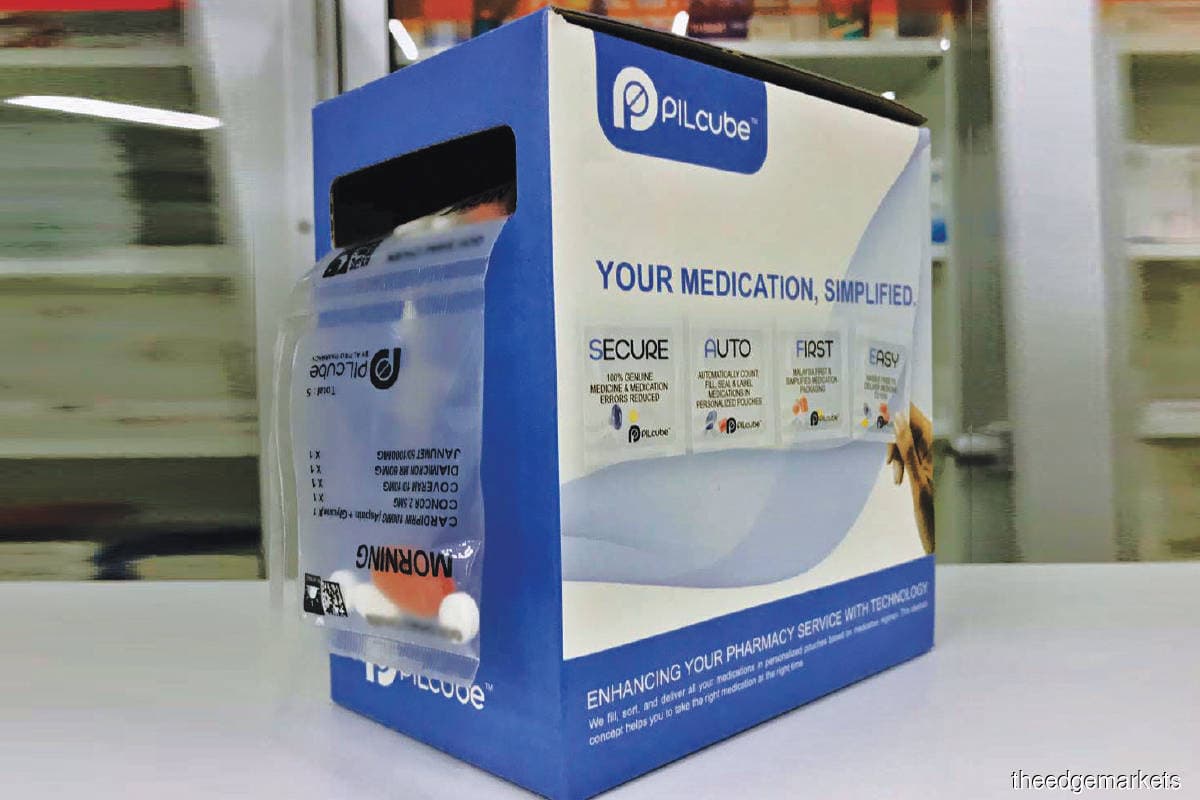
This article first appeared in Digital Edge, The Edge Malaysia Weekly on February 8, 2021 - February 14, 2021
As a pharmacist, Then Ru Luen has noticed that many patients do not take their medication according to schedule, particularly the elderly and working adults who have to take multiple tablets a day. Obviously, this can put their health in danger, and it is disheartening for a pharmacist to see this happen.
“That’s why we came up with the PILcube [in early 2020], where we incorporate technology into the pharmacy packaging system. We put all the medication that a patient needs into a single package that he can just tear and consume,” says Then, who is corporate key account manager at Alpro Pharmacy Sdn Bhd which, according to its website, is the largest prescription pharmacy chain in the country.
“Let’s say every morning you need to consume four tablets, a combination of high blood pressure and diabetic medications. You don’t need to go through the hassle of finding the right tablets in separate blister packets. With this solution, you can tear just one pouch from the PILcube and consume the tablets in it.”
The pouches in PILcube are arranged in sequence according to the patient’s medication schedule. Each pouch is labelled with the time the patient should take it as well as the types of medication in each pouch. The patient just needs to tear out a pouch at the right time and consume the tablets in it.
On the back end, PILcube introduces automation into the pharmacy packaging process and it is integrated with the telemedicine services. For instance, once Alpro receives an electronic order, the PILcube system reads the e-prescription and feeds it to a machine that automatically dispenses the right combination of medications into individual pouches. The machine draws from canisters filled with different types of medication in the pharmacy.
“It is an automated and simplified process. The conventional method is that pharmacists will sort medications into separate blister packs, which they have to do manually. We let the PILcube machine do the sorting and sealing of the packets,” says Then.
With PILcube, all the pharmacists have to do is ensure the canisters are fully stocked, check if the right medications have been put into the pouches and monitor for any drug combinations that could have negative side effects. PILcube is offered to Alpro’s retail customers and those who use Doc2Us’ e-prescription services.
According to Then and Dr Raymond Choy, co-founder and CEO of Doc2Us, PILcube is the first and only such service in Malaysia. A similar model is used by US-based PillPack, which was acquired by Amazon.com two years ago.
Spearheading the digital health revolution
PILcube’s automated packing process and personalised solution for patients are part of what the digital health revolution attempts to deliver.
“We are a digital health platform and e-prescription specialist in Malaysia. E-prescriptions by doctors are legal documents. It flows in real time through our system to our central pharmacy, which is Alpro Pharmacy, which can dispense medications according to the e-prescriptions and send it to consumers. We are trying to automate the process as much as possible and leverage technology,” says Choy.
According to him, Doc2Us is currently the only telemedicine provider in Malaysia approved by the Ministry of Health to provide digitally signed e-prescription services.
Patients who check out from Doc2Us’ online portal after seeing a doctor online can choose to pick up the medication themselves or have it delivered to their homes. On top of that, they can opt for the PILcube service.
“This service is going to be very beneficial for elderly and polypharmacy patients, or those who have to take more than two medications per day. Some patients may take up to 10 medications per day, combined with vitamins and supplements. PILcube is a very innovative solution and a disruption in Malaysia’s dispensing industry,” says Choy.
Alpro spent a hefty amount to build the PILcube machine, but Then believes the investment was worth it. “We approached Doc2Us because we needed a platform to roll out this service. Since Doc2Us has been serving corporations with its telemedicine platform, we thought this could be a good value-added service for it,” he says.
“Together with Doc2Us, we want to improve medication compliance. There is no point dispensing medication if our customers do not consume them in the right manner.”
Rolling out in stages
In 2020, PILcube was piloted in some of Doc2Us’ corporate clients while Alpro launched it in some of its retail consumer markets. They launched the service for corporate and retail consumers in selected locations in December.
According to Then, the pharmacy has been packing about 100 PILcubes a day for both its own retail customers as well as Doc2Us’ corporate clients. “At the moment, we are covering mostly Negeri Sembilan and Melaka because that is the current location of the packaging machine. But we did launch in some areas in Johor, Penang and Kuala Lumpur as well. By the second quarter of this year, I think we will be able to cover most of Malaysia,” he says.
The service is currently offered free of charge to Alpro’s retail clients who are on chronic medication. Meanwhile, Doc2Us rolled out this service for its corporate clients that offer health benefits to their employees.
“We are also going to roll out a reminder system. We will proactively anticipate when you will run out of medication and remind you when it is time to refill,” says Choy.
Save by subscribing to us for your print and/or digital copy.
P/S: The Edge is also available on Apple's AppStore and Androids' Google Play.

